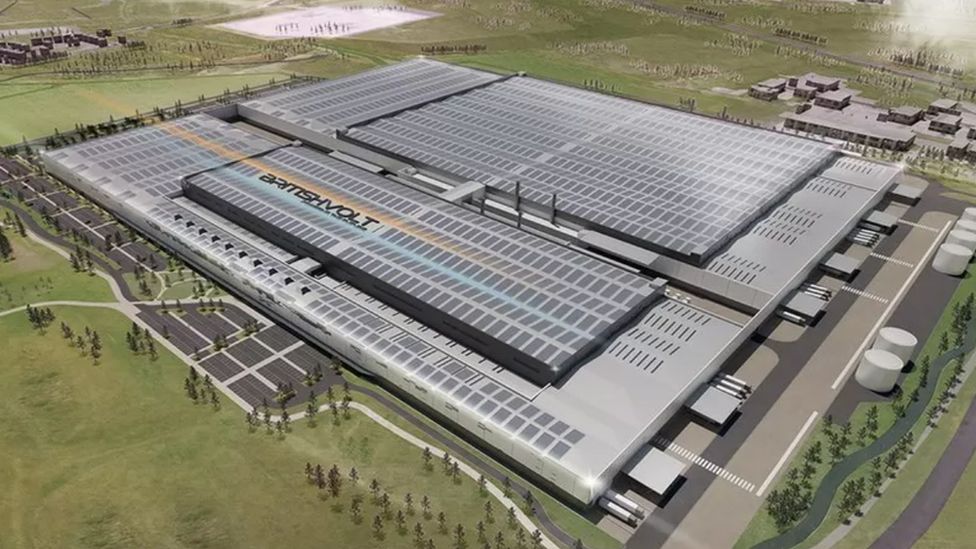ARTICLE AD BOX
 Image source, Britishvolt
Image source, Britishvolt
By Simon Jack
Business editor
Fears for the future of Britishvolt, the company that wants to build a new factory in the UK to make batteries for electric cars, remain high.
The financially troubled manufacturer has called an all-staff meeting for later on Monday.
Shareholders in Britishvolt have been voting on who will take over a flagship project to build a £4bn car battery plant in the Port of Blyth in Tyneside.
There are two competing bids for the project.
However, with no deal yet announced it appears likely that neither of the two bidders secured the 75% of votes required to complete the purchase.
This would leave the company drained of cash and heading for an administration it only narrowly avoided at the end of last year after an emergency lifeline was extended by one of its investors, the commodity trading giant Glencore.
The two bidders included an investment group with links to Indonesia, with a dormant UK subsidiary and no track record in manufacturing, up against a rump of small existing investors keen to avoid seeing the value of their shares totally wiped out.
Industry watchers have expressed dismay at the fact that a plant considered absolutely vital to the future of car making in this country should be hanging in the balance this way.
The plant was also seen meeting the government's levelling up agenda to create prosperity in places like Tyneside, and one that will help secure more resilient supply chains within the UK
Privately, people close to the situation have expressed surprise and frustration that the government has not taken a more active role in shaping the outcome of such a crucial project.
Other bidders?
Last year, Britishvolt asked the government to advance £30m of a promised £100m in support, but was refused as the company had not hit agreed construction milestones to access the funds.
The BBC understands that request was followed by another for £11.5m - then just £3m. Government sources say that sowed seeds of profound doubt over the viability of the company.
Some in government have expressed a preference for the company in its current form to collapse into administration so that more serious players can take the project on.
Candidates that have been mentioned include Tata, the Indian parent of Jaguar Land Rover, Chinese firm Envision which owns the UK's only existing battery plant in Sunderland for the exclusive use of Nissan, and a potential Korean manufacturer.
While efforts to get cracking on this crucial plant flounder, there are 35 battery plants in various stages of construction in the EU.
It begs the question whether the UK has - or needs - an industrial strategy?
Former Business Secretary Greg Clark put in place a strategy back in 2016 despite the Conservative Party being historically sceptical of the notion of overt government involvement in the private sector.
The term was seen as synonymous with "picking winners" and was all but banned when Kwasi Kwarteng took over at the Department for Business, Energy & Industrial Support (Beis) and subsequently the Treasury.
But Mr Clark said at the time that the government did not need to pick winners but ask strategic questions such as - are we going to need more batteries, satellites, pharmaceuticals etc?
It also needed to shape support via grants and tie ups with academic and industrial institutions in sectors at which the UK excelled and would need in the economy of the future.
Insiders at Beis now say they are not working to any particular plan. Of the current situation at Britishvolt, one said, "if they can raise capital privately then they should be allowed to do that", while stressing that government help of £100m was still available to whomever hit specific construction milestones.
Meanwhile the clock is ticking. By 2026, the vast majority of a car's value will have to be sourced in the UK or the EU to qualify for tariff-free export to the EU - where most UK-made cars are sold.
More positively, it seems that everyone agrees that the site in Blyth is perfect for a plant. There is broad industry and political support for it to go ahead and it is expected to happen when serious players get involved.
However, industry experts say the UK will need at least four battery plants to support domestic car making, and for now they are looking on with despair and frustration at the chaotic developments at Britishvolt.

 2 years ago
35
2 years ago
35








 English (US) ·
English (US) ·